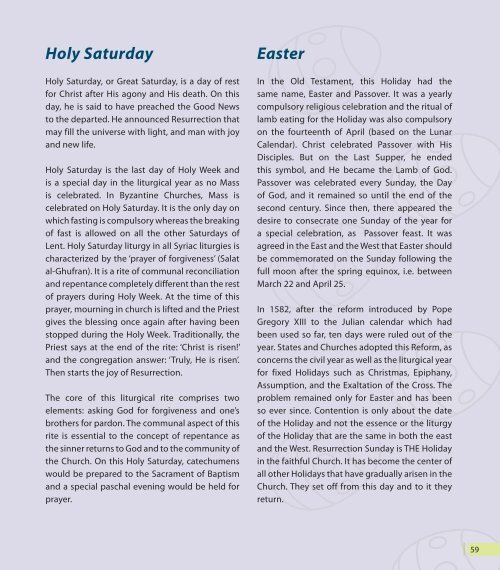Cultural aspects in Christian and Islamic religions - unesdoc - Unesco
Cultural aspects in Christian and Islamic religions - unesdoc - Unesco
Cultural aspects in Christian and Islamic religions - unesdoc - Unesco
You also want an ePaper? Increase the reach of your titles
YUMPU automatically turns print PDFs into web optimized ePapers that Google loves.
Holy Saturday<br />
Holy Saturday, or Great Saturday, is a day of rest<br />
for Christ after His agony <strong>and</strong> His death. On this<br />
day, he is said to have preached the Good News<br />
to the departed. He announced Resurrection that<br />
may fill the universe with light, <strong>and</strong> man with joy<br />
<strong>and</strong> new life.<br />
Holy Saturday is the last day of Holy Week <strong>and</strong><br />
is a special day <strong>in</strong> the liturgical year as no Mass<br />
is celebrated. In Byzant<strong>in</strong>e Churches, Mass is<br />
celebrated on Holy Saturday. It is the only day on<br />
which fast<strong>in</strong>g is compulsory whereas the break<strong>in</strong>g<br />
of fast is allowed on all the other Saturdays of<br />
Lent. Holy Saturday liturgy <strong>in</strong> all Syriac liturgies is<br />
characterized by the ‘prayer of forgiveness’ (Salat<br />
al-Ghufran). It is a rite of communal reconciliation<br />
<strong>and</strong> repentance completely different than the rest<br />
of prayers dur<strong>in</strong>g Holy Week. At the time of this<br />
prayer, mourn<strong>in</strong>g <strong>in</strong> church is lifted <strong>and</strong> the Priest<br />
gives the bless<strong>in</strong>g once aga<strong>in</strong> after hav<strong>in</strong>g been<br />
stopped dur<strong>in</strong>g the Holy Week. Traditionally, the<br />
Priest says at the end of the rite: ‘Christ is risen!’<br />
<strong>and</strong> the congregation answer: ‘Truly, He is risen’.<br />
Then starts the joy of Resurrection.<br />
The core of this liturgical rite comprises two<br />
elements: ask<strong>in</strong>g God for forgiveness <strong>and</strong> one’s<br />
brothers for pardon. The communal aspect of this<br />
rite is essential to the concept of repentance as<br />
the s<strong>in</strong>ner returns to God <strong>and</strong> to the community of<br />
the Church. On this Holy Saturday, catechumens<br />
would be prepared to the Sacrament of Baptism<br />
<strong>and</strong> a special paschal even<strong>in</strong>g would be held for<br />
prayer.<br />
Easter<br />
In the Old Testament, this Holiday had the<br />
same name, Easter <strong>and</strong> Passover. It was a yearly<br />
compulsory religious celebration <strong>and</strong> the ritual of<br />
lamb eat<strong>in</strong>g for the Holiday was also compulsory<br />
on the fourteenth of April (based on the Lunar<br />
Calendar). Christ celebrated Passover with His<br />
Disciples. But on the Last Supper, he ended<br />
this symbol, <strong>and</strong> He became the Lamb of God.<br />
Passover was celebrated every Sunday, the Day<br />
of God, <strong>and</strong> it rema<strong>in</strong>ed so until the end of the<br />
second century. S<strong>in</strong>ce then, there appeared the<br />
desire to consecrate one Sunday of the year for<br />
a special celebration, as Passover feast. It was<br />
agreed <strong>in</strong> the East <strong>and</strong> the West that Easter should<br />
be commemorated on the Sunday follow<strong>in</strong>g the<br />
full moon after the spr<strong>in</strong>g equ<strong>in</strong>ox, i.e. between<br />
March 22 <strong>and</strong> April 25.<br />
In 1582, after the reform <strong>in</strong>troduced by Pope<br />
Gregory XIII to the Julian calendar which had<br />
been used so far, ten days were ruled out of the<br />
year. States <strong>and</strong> Churches adopted this Reform, as<br />
concerns the civil year as well as the liturgical year<br />
for fixed Holidays such as Christmas, Epiphany,<br />
Assumption, <strong>and</strong> the Exaltation of the Cross. The<br />
problem rema<strong>in</strong>ed only for Easter <strong>and</strong> has been<br />
so ever s<strong>in</strong>ce. Contention is only about the date<br />
of the Holiday <strong>and</strong> not the essence or the liturgy<br />
of the Holiday that are the same <strong>in</strong> both the east<br />
<strong>and</strong> the West. Resurrection Sunday is THE Holiday<br />
<strong>in</strong> the faithful Church. It has become the center of<br />
all other Holidays that have gradually arisen <strong>in</strong> the<br />
Church. They set off from this day <strong>and</strong> to it they<br />
return.<br />
59

















